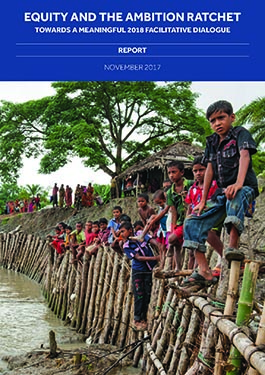ActionAid, along with over 100 allied civil society organizations, released this discussion paper at the 2017 UN climate negotiations in Bonn, Germany. We use an analysis of what various countries’ “fair shares” of climate action are – highlighting the US, EU, China, and India – and draw two key conclusions for the world to have any hope of keeping global temperature rise under 1.5 degrees Celsius – the stated goal of the Paris Agreement.
First, literally every country in the world must do more than what it has currently pledged under the Paris Agreement. Rich industrialized countries like the US are pledging far less than their fair share of global emissions reductions, and poorer countries will need to transition to clean economies much faster than they currently are. Second, these poorer countries must be supported by international finance and technology transfer in order to preserve any semblance of fairness and to be able to make this transition at the necessary speed.
The report, like its predecessor reports in 2015 and 2016, was jointly written by a broad coalition of organizations representing a vast range of constituents. Key signatories alongside ActionAid include ACT Alliance, Asian Peoples’ Movement on Debt and Development, CARE, Christian Aid, CIDSE, Climate Action Network International, Climate Action Network South Asia, Friends of the Earth, the International Trade Union Confederation, Oxfam, Pan African Climate Justice Alliance, Third World Network, WWF, 350.org, and many more.
November 7, 2017
8

